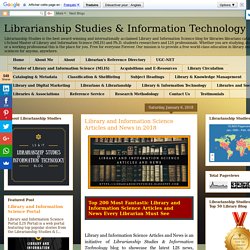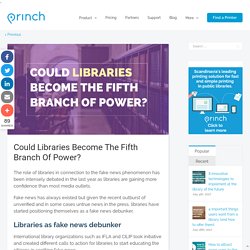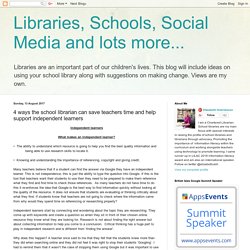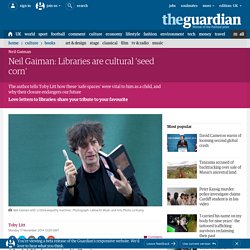

Culturally Safe Libraries: Working with Indigenous collections. Library Publishing Toolkit. Five Unexpected Benefits of Eliminating Library Fines - Information Space. The iSchool Public Libraries Initiative (IPLI) is a research group within the iSchool that focuses on public library research.

I was curious about what evidence supports the widespread use of library fines. I was surprised to find that there are few studies that show they are effective at getting patrons to return items on time. This discovery prompted an investigation into the potential benefits of eliminating fines. I interviewed 15 librarians across the United States who work at libraries that have eliminated fines in the past few years. The most illuminating result of this research was the variety of advantages that the librarians described as a result of eliminating fines. I wanted to share five unique benefits the librarians identified. Benefit #1: Librarians and staff can provide better service to patrons. Marketing Your Library's Electronic Resources, Second Edition: A How-To-Do-It Manual for Librarians. Librarianship Studies & Information Technology: Library and Information Science Articles and News in 2018.
Librarianship Studies & Information Technology is divided into following broad categories.

Categories are listed on the top left side of the blog. These categories or labels group blog posts on a specific topic of Library & Information Science. SCOPE: On acquisitions or books, serials, e-resources, etc. in libraries in information centers. Collection Development--Books, Serials, Non-book Materials--Selection, Acquisition, Maintenance; ISBN, ISSN, Cataloguing-in-Publication (CIP), E-documents, E-books, E-journals, Etc. SCOPE: On cataloging and metadata. SCOPE: Theory and practice of library classification and shelflisting. SCOPE: Librarian's Reference Directory (or Librarians Reference Sources Directory) is a web directory of Library and Information Science reference sources on the World Wide Web. 8 Simple Photography Tricks Every Librarian Should Know. Let's talk about library photography.

If you are lucky, newspaper reporters will come in and cover your programs. But even if they do, it is still important to take your own pictures of your events for the library website and social media, at the very least. However, photography is something that they don't teach you in grad school, so we're left to our own devices. Over the years, I've learned a few tricks that have upped my photography game. Maybe you'll find these helpful, too. #1. I couldn't believe how much of a difference it made when we bought a DSLR camera, the Canon EOS Rebel (thanks to the our teens voting for a Photography Makerspace) . #2. A photographer expert gave me this great tip that I never even realized -- if you focus on the performer, you are giving that performer free publicity. . #3. Could Libraries Become The Fifth Branch Of Power?
The role of libraries in connection to the fake news phenomenon has been intensely debated in the last year as libraries are gaining more confidence than most media outlets.

Fake news has always existed but given the recent outburst of unverified and in some cases untrue news in the press, libraries have started positioning themselves as a fake news debunker. Libraries as fake news debunker International library organizations such as IFLA and CILIP took initiative and created different calls to action for libraries to start educating the citizens in spotting fake news. IFLA took its inspiration from FactCheck.org’s 2016 article How to Spot Fake News and created a visual representation of it with eight simple steps to discover the verifiability of a given news-piece in front of you. Transforming library services: Global, connected, rich and accessible. Libraries, Schools, Social Media and lots more...: 4 ways the school librarian can save teachers time and help support independent learners. Independent learners What makes an Independent learner?

• The ability to understand which resource is going to help you find the best quality information and being able to use research skills to locate it. • Knowing and understanding the importance of referencing, copyright and giving credit. Many teachers believe that if a student can find the answer via Google they have an independent learner. Cherrybrook Technology High School: Log in to the site.
Meet the Tabletarians. In March 2011, the Boise Public Library (BPL), ID, used $3,300 in Library Services and Technology Act (LSTA) grant funding to purchase four iPad 2 tablets and all of the trimmings, such as wireless keyboard docks, barcode scanners, and cases with hand grips.

According to “Roving Reference, iPad-Style,” published in the Idaho Librarian in November 2011, “the goal of the grant was to increase staff interaction with customers by giving librarians tools to move out from behind the desk.” As with BPL, many libraries had been looking for ways to showcase librarian and staff expertise and enhance customer service. Having staff stroll the stacks and proactively offer assistance is one way to ensure that even the most reference desk–averse patrons are finding what they need, and Apple’s new tablets—the original iPad had been introduced less than a year earlier—seemed like the perfect accessory for roving reference.
Neil Gaiman: Libraries are cultural 'seed corn' A feral child who was raised in libraries.
